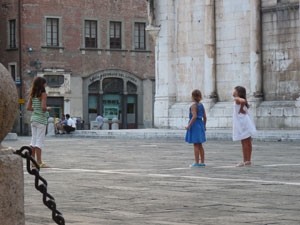 Child friendly Florence was transformed into an even grander kids’ paradise during the Child in the City Conference held October 27 to 29, 2010 at the Palazzo dei Congressi. The international conference—presented biannually by Child in the City Foundation and European Network of Child Friendly Cities—fostered discussion and debate on efforts to make cities more hospitable to children.
Child friendly Florence was transformed into an even grander kids’ paradise during the Child in the City Conference held October 27 to 29, 2010 at the Palazzo dei Congressi. The international conference—presented biannually by Child in the City Foundation and European Network of Child Friendly Cities—fostered discussion and debate on efforts to make cities more hospitable to children.
This year’s conference was divided into four thematic areas—play and mobility, assessment, participation, and poverty. Each presentation was aimed at inspiring through sharing information on best practices. While the majority of the 275 participants hailed from Europe, a total of 36 countries were represented including Brazil, Japan, China, and the United States.
The three days of discussion about urban policies primarily concerned acting on recommendations set forth by the 1990 United Nations Convention on the Rights of the Child (UNCRC)—a human rights treaty concerning the civil, political, economic, social, and cultural rights of children. In fact, the United Nations Children’s Fund (UNICEF) played a major role in the conference, especially in terms of assessment and in outlining past and current projects meant to inspire positive action.
Sessions on participation included city-specific case studies that examined how including children in the decision-making process is a prime way to create a city with children, not for children. Examples from various European cities showed that participation begins in the informal interaction kids have with one another in public spaces where they inherently self-organize, thereby learning tolerance, trust, and reciprocity.
Play and mobility sessions focused on the role of free play in building social and emotional skills and the importance of safe public spaces where children and adults coexist without the segregation typical of most urban play environments (i.e., parks and playgrounds). One of the most intriguing presentations in this section was the “Institution of a Day for Play: A Proposal for a National Law” by Francesco Langella, an education administrator from a small city near Naples. Every spring, the town hosts the “Giorno del Gioco” in an effort to bring attention to the importance of play when thinking about child-friendly public spaces.
Presentations on poverty focused on combating the self-exclusion and mental blocks that it creates in young children and the importance of building self-esteem during the first years of a child’s life. Assessment sessions centered on the need to improve evaluation tools for youth policies, how to simplify them, and how to identify practices that approach policy building from the bottom up.
Regarding Italy and its future in terms of child rights, Florence-based Istituto degli Innocenti director Alessandra Maggi officially re-launched the Italian Child Friendly Cities Initiative. Originally run from 1998 to 2002 by the Italian Ministry for the Environment in collaboration with the Istituto degli Innocenti and the Italian Committee for UNICEF, the goal of the initiative was to promote the implementation of the UNCRC at the local level. It consisted of strong child participation and assessment components—a certification strategy was put in place that “awarded” cities based on progress attained in the realm of children’s rights. The initiative fostered the creation of ideas and projects that helped local administrations rethink the importance of youth participation and to review urban policies and their effect on children. Maggi noted that nearly 10 years after the initiative was launched, this is the right time to reintroduce the successful project that highlights the fact that children need to play a recognized role in accordance with the UNCRC, especially in cities—the majority of which are not considered child friendly.
In re-launching Italian Child Friendly Cities, attention must be placed on children in urban contexts and their interaction with their surroundings. Maggi asserted that institutions should favor the active participation of kids, as well as promote research and innovation in improving quality of life in urban contexts.
While we may be far from classifying Florence, Italy or Europe as a kids’ paradise, conferences like Child in the City certainly move us one step closer to creating communities where children are not only protected, but included in the creation of local child-friendly policies.
Author Alexandra Lawrence is a writer, teacher, licensed tour guide, and mother of a Florentine-American son. You can find more of her writing at www.theflorentine.net.
 Add to favorites
Add to favorites
Connect